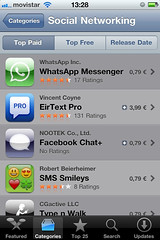
Photo credit hildgrim
Like Symantec, Apple too have a significant Green story that they are not telling – and it just got a lot Greener!
Why do I say they have a Green story in the first place? Aren’t they just constantly exhorting us to buy their products? How is that sustainable?
Well, let me start by making a confession – I am an Apple fanboy. I love their kit. I bought my first computer (a used Apple Mac SE FDHD) back in 1989 and ever since then, even when I worked as a Windows Sysadmin, my own personal machine has always been a Mac.
When Apple brought out their 3G iPhone, I bought one of those too. And I loved it. The device was, without doubt, a defining moment in the history of mobile phones. And this is where Apple’s Green story started to become more obvious to me. My previous phones had, for almost all the previous 12 years, been Nokia’s. The average lifetime of my Nokia handsets was typically less than a year (usually 6-9 months). A new mobile would come out with the next killer feature, and I’d shell out.
However, with the iPhone 3G, Apple kept upgrading the operating system, adding more and more functionality, and making it freely available for download directly onto the phone. This meant I was able to get all the new functionality, without having to buy any new hardware. This is a definite dematerialisation win – it takes a lot less carbon to download a new operating system, than to buy a new phone.
At the same time, Apple launched the App store for the iPhone. This meant you could go to a library of programs written specifically for the iPhone and download one directly for your mobile if it had functionality (or a game!) you wanted. This ability to easily extend the functionality of the devices at will, also meant they tended to have a longer working life.
When I did finally upgrade from the iPhone 3G, to the iPhone 4 (2 years later), I had a buyer already lined up for the iPhone 3G, so it lives on (and is still much loved by its new owner!).
Similarly, Apple’s Mac hardware is hugely desirable. Every one of my Mac desktops and laptops has been passed on after I have finished with them. Macs are always in demand, even second hand. I never have a problem finding someone to take a used Mac off my hands. On the other hand, I have a Sony Viao laptop from 2007 that I couldn’t give away!
So why do I say Apple just got a lot Greener?
Because Apple recently announced that it is now creating a Mac App store. This is a superb move. As of Oct 20th 2010 Apple had 7bn application downloads from its existing iPhone app store (it launched in mid-2008). For many reasons, the Mac app store will be highly unlikely to have as many downloads in the same period of time, but even if it shifts a mere 7m apps from being physically created and shipped, to being simply downloaded, that is a big carbon saving.
This is not just good news for Apple though – I mentioned here a while back that Adobe were charging people more for a downloadable copies of their software than for shipped physical copies of the same software! This obviously makes no sense but is a result of vagaries of EU taxation which Adobe neglected to factor into their pricing and as a result they are actively encouraging people to purchase physical copies of their products!
In the (albeit highly unlikely) event that Adobe were to sell their software through the Mac app store, then they could hand off the responsibility for worrying about EU tax and pricing issues to Apple.
Will Microsoft and other large vendors let Apple let Apple sell their software for them? They’d be crazy not to.
By going with the mac App store they get a software shop delivered straight onto every Mac owner’s desktop (you can be sure the Mac app store will be part of the desktop with OS X Lion when it ships, as well as an update for all other systems). They also get a ready-made way to reduce the carbon emissions (and media, packaging and freight costs) associated with every software sale!
Now Apple have a history of being market leaders (witness their creation recently of the tablet market with the launch of their iPad). There is no doubt that other vendors will quickly follow Apple’s lead in creating online stores for their software – does this mean the era of software being shipped by courier or through the post is coming to an end? Let’s hope so.
All that and we haven’t even talked about what iTunes did for music CDs or what the Apple TV will do to rid the world of pesky, scratch-prone, physical DVDs!


I found out about a new training program for the federal government’s Home Energy Score Program. (see http://www.homeenergyscore.gov)
You take a free course, then you take a second course to get certified to work as a Home Energy Score Qualified Assessor. (paid by grant money from the government)